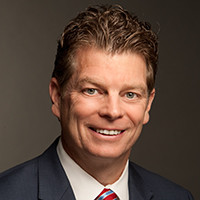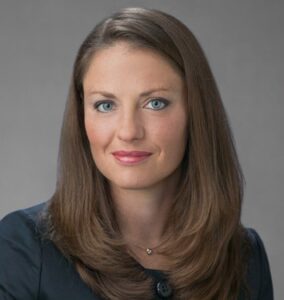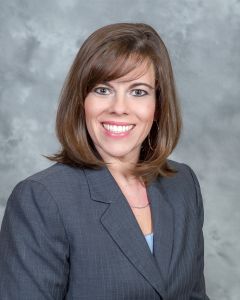Our Conference Speakers

Mary Akkerman, Esquire
Mary Akkerman practices in estate planning, including dynasty trusts, domestic asset protection trusts, estate and trust administration, guardianships and conservatorships, business and tax planning, estate and gift tax planning, tax appeals, and related litigation. She is skilled at establishing public and private trust companies in South Dakota and regularly works with U.S. and international families and advisors. Mary is an American College of Trust and Estate Counsel (ACTEC) Fellow. She is a member of the Society of Trust and Estate Practitioners and Sioux Falls Estate Planning Council. Mary has received an AV Preeminent® Peer Review Rating by Martindale-Hubbell®, for the highest level of professional excellence for legal knowledge, communication skills and ethical standards. She has a Band 1 individual ranking in the Chambers High Net Worth Guide by Chambers and Partners in the area of Private Wealth Law, and is listed in The Best Lawyers in America© in Trusts & Estates. Mary has also been ranked in the top 5% of practicing attorneys in South Dakota by Great Plains Super Lawyers in the areas of Estate Planning & Probate.
Topic: Introduction to Gun Trusts
Firearm ownership presents unique challenges for trust and estate planning. This seminar will provide a comprehensive introduction to Gun Trusts and handling of firearms in trusts and probate estates. Designed for a beginning practitioner, someone looking to add more sophisticated estate planning techniques to an existing practice, or a practitioner whose clients are gun enthusiasts, Introduction to Gun Trusts covers basic Gun Trust information, along with a primer on applicable federal and state laws pertaining to possession and ownership of firearms.

Antonia M. Dumas, Esquire
Antonia Dumas is an attorney with experience at the intersection of data privacy, cybersecurity, and technology. She counsels clients on domestic and international data privacy and cybersecurity laws and works with clients across multiple sectors to build customized comprehensive compliance programs mapping cybersecurity controls and frameworks, such as the National Institutes of Standard and Technology and International Standards Organization frameworks with current global privacy and cybersecurity regulations. She leverages this experience to partner with a wide variety of stakeholders, including executives, in-house counsel, and key business units to identify potential vulnerabilities and liabilities in their policies and procedures and works to mitigate legal risk using practical, cost-effective solutions. Prior to joining Beckage, Antonia focused much of her practice on privacy compliance for clients in emerging technology, media, entertainment, and retail, including industry-driven privacy obligations (e.g., Apple’s Privacy Labels for mobile applications). She also has additional practical experience in other areas such as marketing and project management including website design and development, customized software development projects, installation and management of smart devices, and development and implementation of building automation systems. She continues to leverage her experience in these areas to provide guidance for global privacy and security compliance specific to websites, mobile applications and software (e.g., SaaS products). Further, she counsels clients on privacy related issues emerging from marketing activities through websites, e-commerce platforms, mobile applications, email marketing and telephone communications and texting. She performs detailed reviews and assessments of websites, e-commerce platforms, and mobile applications to identify key areas of risk such as deficiencies in privacy notices and consent mechanisms (e.g., cookie consent banners) and accessibility issues for American with Disabilities Act (ADA) compliance. Outside of her legal practice, Antonia is passionate about people and community involvement and has contributed her time and energy to the American Red Cross Disaster Relief Program, Pennsylvania Bar Association’s Wills for Heroes, and HIAS Pennsylvania’s Citizenship Day (assisting Spanish-speaking applicants). She serves as a mentor for students interested in cyber and STEM and college students seeking a legal education. She is an active writer and speaker on privacy, cybersecurity, and technology issues as well as diversity, equity and inclusion and serves as an Adjunct Professor at Chestnut Hill College on cybersecurity law. She is a member of the DC Bar Association, International Association of Privacy Professionals (IAPP), Blacks in Cybersecurity and Women in Technology. She holds her J.D. from Temple University Beasley School of Law, attended Universidad de Rey Juan Carlos, School of Law and Social Sciences, earned a Spanish Language and Culture Certificate from the University of Salamanca and earned a B. A. with honors from Saint Joseph’s University.
Topic: Apple’s New Privacy Requirements – Balancing Legal Privacy Compliance with Industry Standards
At the end of 2020, Apple rolled out new privacy initiatives including privacy and security updates affecting mobile applications (on the Apple Store) and its Safari web browser. These changes have important implications for businesses to manage their privacy and security compliance and verify that disclosures are consistent. Of these changes, attorneys should keep two key requirements in mind: (1) required standardized disclosures of privacy and security practices (Apple Store “Nutrition Label”), and (2) change from an opt-out to opt-in consent mechanism for device tracking (i.e., opt-in default for IDFA). Further, attorneys need to balance these types of industry driven requirements and standards with existing legal privacy and security obligations.

Patrick J. Paul, Esquire
Biography
Patrick Paul is a practical problem solver with more than 25 years of experience developing meaningful relationships with critical decision makers. With notable land use, environmental due diligence, zoning, regulatory, renewable energy and litigation experience, Patrick assists both large and small clients in traditional and developing industries manage regulatory compliance issues associated with the construction and development of manufacturing, distribution, renewable and fossil fuel power production facilities, hospitality venues, and the management of related complex land use, environmental and regulatory issues. He also provides land use and zoning counseling and assists new and expanding businesses maximize available economic incentives to facilitate relocation and growth. Patrick consistently represents clients before a bevy of regulatory agencies on environmental permitting matters, including air emissions, water utilization, wastewater discharge, and energy storage matters. He also represents clients in connection with the use of drones and unmanned aerial vehicles. In addition, Patrick regularly counsels clients with respect to the acquisition of food safety and liquor licenses regarding the production, importation and distribution of spiritous liquors for alcohol beverage companies, brewers, hotels, management companies, golf courses, restaurants and bars. He is a frequent author and speaker on these issues to various industry, legislative and legal education organizations, including as an adjunct professor in the Master of Real Estate Development (MRED) program at the W.P. Carey School of Business at Arizona State University.
Topic – Current & Future Drone Regulations
A brief history of unmanned aerial systems and what currently qualifies as a drone or UAS, including the
evolving regulatory scheme and the role of the Federal Aviation Administration and state and local
governments in dealing with drone use within their respective jurisdictions. Additionally, an overview of
the current usage of drones across a vast array of industries and the corresponding concerns. Will be
shared. Finally, we will discuss the current state of experimental air taxis as well as certain technological
and regulatory parallels with the evolving autonomous vehicle industry.
Key Topics
• A current overview of unmanned aircraft systems and drones
• How Drones are currently Being Utilized
• Evolving drone regulation
• The Future Uses of Drones, including air taxis and the intersection with autonomous vehicles

Rachel V. Rose, Esquire
Biography
Rachel V. Rose, JD, MBA is a Principal with Rachel V. Rose – Attorney at Law, P.L.L.C. (Houston, TX). Ms. Rose advises clients on compliance, transactions, and litigation in healthcare, cybersecurity, corporate and securities law, while successfully representing plaintiffs in False Claims Act and Dodd-Frank whistleblower cases. Ms. Rose has a unique background, having worked in many different facets of healthcare, securities, cybersecurity, as well as international law and business throughout her career. For nearly a decade, her practice has focused transactional, compliance, and litigation matters related to cybersecurity, health care, securities, and Dodd-Frank/False Claims Act whistleblower claims. Ms. Rose worked on Capitol Hill when HIPAA passed in 1996 and worked at HHS in 2009 when the HITECH Act was being implemented. In addition to being extensively published and a sought-after presenter and quoted expert, Ms. Rose holds an MBA with minors in healthcare and entrepreneurship from Vanderbilt University, and a law degree from Stetson University College of Law, where she graduated with various honors. Ms. Rose is licensed in Texas and is a Fellow of the Federal Bar Association. Currently, she is the Chair of the Federal Bar Association’s Government Relations Committee, a board member of the Federal Bar Association’s Qui Tam Section, the co-editor of the American Health Lawyers Association’s Enterprise Risk Management Handbook for Healthcare Entities (2nd Edition), as well as a co-author of the ABA’s books The ABCs of ACOs and What Are International HIPAA Considerations? She has been named consecutively to the Texas Bar College, the National Women Trial Lawyers Association’s Top 25, Houstonia Magazine’s Top Lawyers (healthcare), the National Trial Lawyers Association’s Top 100, as well as 1st Healthcare Compliance’s 2019 Top Presenter. Ms. Rose is also an Affiliated Member with the Baylor College of Medicine’s Center for Medical Ethics and Health Policy, where she teaches bioethics. Federal Court Admissions: Supreme Court of the United States, CO, DC, SDTX, NDTX, EDTX and WDTX. See http://www.rvrose.com for additional information.
Topic: How the Legal community Should be Protecting itself from Ransomware Attacks
Short Description
Over the past year, both national and international government agencies have increasingly provided alerts on the rise of exploitation by cybercriminals, including the deployment of ransomware. Attorneys have a professional responsibility to be competent with technology, as well as safeguard confidential and protected information. The purpose of this presentation has two main facets: (1) understanding ransomware attacks, as well as ways to prevent them; and (2) a lawyer’s perspective on the legal ramifications of prevention, detection, and correction, as well as personal experience in representing clients.
ABA Book – What are International HIPAA Considerations? (R. Rose, L. Rose, J. Tomes).

Kelly Burris, Esquire
Biography
1. Board Certified in Family Law by the Texas Board of Legal Specialization 2. 21 Years in Practice 3. Senior Litigation Partner at Cordell & Cordell, the largest law firm specializing only in Family Law in the US 4. Previously listed as Super Lawyer and Rising Star in Texas Monthly 5. Quoted in the London Telegraph and other national and international publications in articles relating to divorce and cryptocurrency 6. Articles published in Divorce Magazine and Family Lawyer Magazine on Cryptocurrency and Divorce 7. Have taught CLE’s all over the country regarding cryptocurrency in family law.
Topic: Cryptocurrency in Divorce and Civil Litigation
Short Description
With the rise in Cryptocurrency investment, it is becoming more and more important that all attorneys dealing with any form of financial litigation have a basic knowledge of cryptocurrency assets. Although the general public is frequently investing in and holding Cryptocurrency, it continues to be a topic that many attorneys know little about. Cryptocurrency can seem intimidating, but it is crucial for attorneys to at least have some basic knowledge about this increasingly popular asset. Like cash, cryptocurrency can be easily overlooked or intentionally hidden. Cryptocurrency can be one of the most valuable assets a a party to a lawsuit may have. It is also one of the easiest ways to hide money for a tech savvy, but dishonest spouse. This course will teach attorneys the basics of cryptocurrency as well as how to find it, value it and divide it.

Hannah E. Taylor, Esquire
Biography
Hannah E. Taylor is co-chair of the Blockchain Technology and Advertising, Marketing & Public Relations Groups at Frankfurt Kurnit Klein and Selz, representing clients on digital and media technology, advertising, consumer protection, branded entertainment, and intellectual property matters. Ms. Taylor has received praise in Best Lawyers in America, The Legal 500, Chambers USA, and Super Lawyers. She is an industry thought-leader who frequently speaks at major conferences and is also actively involved in leading industry associations. She works with clients to structure and negotiate virtually every type of media-related agreement, advises clients on claim substantiation and compliance with federal, state, and local laws, as well as on compliance with relevant self-regulatory guidelines, and platform terms, and represents advertisers before the Federal Trade Commission and the National Advertising Division. In recent years, Ms. Taylor has developed particular expertise on emerging technology and how brands and entertainment companies can use social media and blockchain technology (including NFTs) most effectively and avoid significant legal risk.
Topic: Blockchain, NFTs & the Metaverse: Legal and Practical Issues Raised by this New Frontier
In recent years, the term “NFT” has permeated our society, even becoming Collins Dictionary’s 2021 Word of the Year. Between staggering sale prices, celebrity endorsements, and revolutionary use cases, NFTs have taken the world by storm. But what have we learned since this cryptographic craze began? This would cover the current state of the NFT and Web3 culture and community, as well as the most pressing legal issues emerging in this rapidly evolving space.
